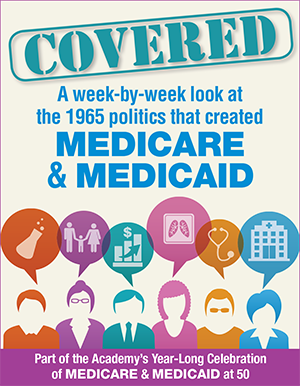Bob Rosenblatt
Throughout 2015, the Academy is working with partners to create a platform for dialogue around the history and future of these two vital programs, including this weekly Covered blog series. Covered is written by Bob Rosenblatt, a Senior Fellow at the National Academy of Social Insurance and editor of the website HelpWithAging. Learn more about the Academy’s celebration of the 50th anniversary of Medicare and Medicaid.
Medicare Conferees Tackle Last Hurdle and Referee Fight Among Docs
By Bob Rosenblatt, Special Correspondent
July 24, 1965
Washington, DC – House and Senate conferees are arguing vigorously about how the new Medicare system will pay specialists taking care of people over age 65 in the hospital once the program begins next year.
Both chambers of Congress passed legislation establishing health care coverage for 20 million seniors but conferees must now settle a dispute among physician groups. The American Medical Association (AMA), which represents the largest number of physicians nationally, has for many years strongly opposed the creation of a Medicare program. Having lost that fight, the AMA is seeking to at least minimize its members’ involvement in the mandatory portion of the government health care program that is an extension of the current Social Security program. The mandatory portion covers hospital services and is financed by taxes paid by workers and their employers. It will automatically be available to all workers who turn 65 years old and have paid a threshold amount into the new Medicare trust fund.
With the backing of the AMA, House Ways and Means Committee Chairman Wilbur Mills (D, AR) crafted a Medicare bill that put physician services under a separate voluntary program, called Medicare Part B. It would be financed not through a government trust fund, but instead through a $6 monthly premium, with half paid by the individual and half by the federal government using general tax revenues. Physicians providing care under Part B will be paid by private insurance companies that agree to act as financial intermediaries for the Medicare program.
At the behest of the AMA, Mills also stripped out language that would have allowed hospital-based physician specialists to include their professional fees in the hospital bills sent to patients and their insurance companies, as is the current practice. The argument was that such services would have to be billed separately since they are covered by the voluntary part of the Medicare program – not the mandatory part of the program.
The Medicare proposal approved by the Senate, although it also includes a separate Part B for physician services, retains the current practice of including specialists’ fees in the hospital bill. This retention of the current practice is supported by the Johnson Administration as well as hospitals and labor unions, which typically offer comprehensive insurance coverage to members and their families.
The AMA’s position would be difficult to carry out, one labor lobbyist argued. “As the bill stands now, each of these [hospital-based specialists] would have to bill the patient separately,” Sidney Zagri, general counsel of the International Brotherhood of Teamsters, told the Senate Finance Committee. “It is indeed an irony that this restriction [sought by the AMA] calls for Federal intervention in relations between hospital and doctor,” Zagri said. “Most of the specialists have accepted being under hospital administration.”
But the AMA was able to persuade members of the House that it does not want any doctor to be under the hospital billing system, which is more likely to be subject to federal regulation. Doctors would be more comfortable dealing with private insurance companies, where they already have a familiar system, the AMA argued.
“The medical profession is still quite antsy about ….manipulation from the outside,” Walter J. McNerney, president of Blue Cross, told the House Ways and Means committee. “The same profession, although it doesn’t always welcome it, is at least fairly used to dealing with an [insurance company] such as ours,” he said.
Zagri gave the Finance Committee a policy statement compiled by a committee of doctors and other medical specialists in New York City. Separating their bills from hospital charges would be a “regressive step” setting back quality 30 years, the doctors said. The best hospitals in the country have seen great advances in medical care because there are full-time salaried physicians devoting their time to quality patient care, education, and research, the doctors argued.
In crafting its Medicare bill, the Senate agreed with the specialists and adopted an amendment sponsored by Sen. Paul Douglas (D-IL) that restored the Administration’s language that was dropped by the House.
This battle between different elements of the medical profession is typical of the last few hurdles House and Senate conferees face in crafting a new health care program for older Americans. The debate this week reflects a common fear among many doctors about the impact of the new medical insurance system for Americans over 65, but it is also a debate on the contours of the program, not whether to have the program at all. That debate seems to be over and the question will soon turn to how the Johnson Administration can implement what by all accounts should be a mammoth undertaking involving millions of patients, and thousands of doctors and hospitals.
► Directory of COVERED posts
► Learn more about the Academy’s celebration of the 50th anniversary of the enactment of Medicare and Medicaid

